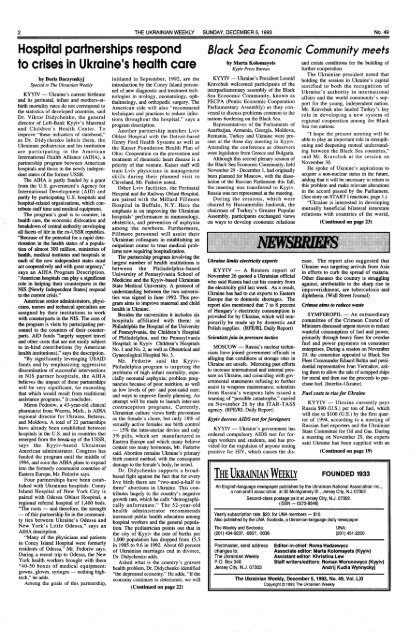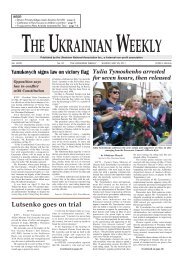The Ukrainian Weekly 1993
The Ukrainian Weekly 1993
The Ukrainian Weekly 1993
You also want an ePaper? Increase the reach of your titles
YUMPU automatically turns print PDFs into web optimized ePapers that Google loves.
Hospital partnerships respondto crises in Ul(raine's tiealtti careby Boris BaczynskyjSpecial to <strong>The</strong> <strong>Ukrainian</strong> <strong>Weekly</strong>KYYTV — Ukraine's current birthrateand its perinatal, infant and mothers-atbirthmortality rates do not correspond tothe statistics of developed countries, saidDr. Viktor Didychenko, the generaldirector of Left-Bank Kyyiv's Maternaland Children's Health Center. Toimprove "these indicators of statehood,"as Dr. Didychenko labels them, the<strong>Ukrainian</strong> pediatrician and his institutionare participating in the AmericanInternational Health Alliance (AIHA), apartnership program between Americanhospitals and those in the newly independentstates of the former USSR.<strong>The</strong> АША is partly funded by a grantfrom the U.S. government's Agency forInternational Development (AID) andpartly by participating U.S. hospitals andhospital-related organizations, which contributestaff tune and medical equipment.<strong>The</strong> program's goal is to counter, inhealth care, the economic dislocation andbreakdown of central authority envelopingall facets of life in the ex-USSR republics."Because of the potential for a rapid deteriorationin the health status of a populationof almost 300 million, ministries ofhealth, medical institutes and hospitals ineach of the new independent states mustact cooperatively and with great urgency,"says an AIHA Program Description."American hospitals can play a sigidficantrole in helping their counterparts in theNIS [Newly Independent States] respondto the cuirent crisis."American senior administrators, physicians,nurses and technical specialists areassigned by their institutions to workwith counterparts in the NIS, <strong>The</strong> core ofthe program is visits by participating personnelto the counters of their counterparts.АГО funds "largely support traveland other costs that are not easily subjectto in-kind contributions (by Americanhealth institutions)," says the description."By significantly leveraging USAIDfunds and by emphasizing aggressivedissemination of successful interventionsin NIS partner hospitals, the AIHAbelieves the impact of these partnershipswill be very significant, far exceedingthat which would result from traditionalassistance programs," it concludes.Miron Fedoriw, a 43-year-old clinicalpharmacist from Warren, Mich., is AIHAregional director for Ukraine, Belarus,and Moldova. A total of 22 partnershipshave already been established betweenhospitals in the U.S. and in countries thatemerged from the break-up of the USSR,says the Kyyiv-based <strong>Ukrainian</strong>American administrator. Congress hasfunded the program until the middle of1994, and soon the AIHA plans to expandinto the formerly communist countries ofEastem Europe, Mr. Fedoriw says.Four partnerships have been establishedwith <strong>Ukrainian</strong> hospitals. ConeyIsland Hospital of New York City ispaired with Odessa Oblast Hospital, aregional referral hospital of 1,400 beds."<strong>The</strong> roots — and therefore, the strength— of this partnership lie in the communityties between Ukraine's Odessa andNew York's Little Odessa," says anAIHA description."Many of the physicians and patientsin Coney Island Hospital were formerlyresidents of Odessa," Mr. Fedoriw says.During a recent trip to Odessa, the NewYork health workers brought with them"40-50 boxes of medical equipment:gowns, gloves, syringes — nothing hightech,"he adds.•Among the goals of this partnership.THE UKRAINIAN WEEKLY SUNDAY, DECEMBER 5,<strong>1993</strong> No. 49initiated in September, 1992, are theintroduction by the Coney Island personnelof new diagnostic and treatment technologiesin urology, neonatology, ophthalmology,and ortiiopedic surgery. <strong>The</strong>American side will also "recommendtechniques and practices to reduce infectionsthroughout the hospital," says aprogram description.Another partnership matches LvivOblast Hospital with the Detroit-basedHenry Ford Health Systems as well asthe Kaiser Foundation Health Plan ofOhio. Cooperation on the prevention andtreatment of rheumatic heart disease is apriority of that venture. Kaiser staff willtrain Lviv physicians in managementskills during their planned visit toCleveland, Mr. Fedoriw noted.Other Lviv facilities, the PerinatalHospital and the Railway Oblast Hospital,are paired with the Millard FillmoreHospital in Buffalo, N.Y. Here theemphasis is on improving the <strong>Ukrainian</strong>hospitals' performance in immunology,obstetrics, and prevention of asphyxiaamong the newborn. Furthermore,Fillmore personnel will assist their<strong>Ukrainian</strong> colleagues in establishing anoutpatient center to treat medical problemsnow requiring hospitalization.<strong>The</strong> partnership program involving thelargest number of health institutions isbetween the Philadelphia-basedUniversity of Pennsylvania School ofMedicine and the Kyyiv-based <strong>Ukrainian</strong>State Medical University. A protocol ofunderstanding between die two universitieswas signed in June 1992. This programaims to improve maternal and childhealth in Ukraine.Besides the universities it includes sixhospitals affiliated with them: inPhiladelphia the Hospital of the Universityof Pennsylvania, the Children's Hospitalof Philadelphia, and the PennsylvaniaHospital; in Kyyiv Children's HospitalsNo. 1 and No. 2, as well as Obstetrical andGynecological Hospital No. 3.Mr. Fedoriw said the Kyyiv-Philadelphia program is targeting theproblems of high infant mortality, especiallyneonatal asphyxia; problem pregnanciesbecause of poor nutrition, as wellas low levels of pre- and post-natal care;and ways to improve family planning. Anattempt will be made to launch inter-sexcontraception programs. Currently,<strong>Ukrainian</strong> culture views birth preventionas the female's chore, but only 18% ofsexually active females use birth control— 15% the intra-uterine device and only3% pills, which are manufactured inEastem Europe and which many believecontain too many hormones, Mr. Fedoriwsaid. Abortion remains Ukraine's primarybirth control method, with the consequentdamage to the female's body, he noted.Dr. Didychenko supports a broadbasedfight against the fact that for everylive birth there are "two-and-a-half tothree" abortions in Ukraine. This contributeshugely to the country's negativegrowth rate, which he calls "demographicallyunfortunate." <strong>The</strong> 52-year-oldhealth administrator recommendsincreased public health education amonghospital workers and the general population.<strong>The</strong> pediatrician points out that inthe city of Kyyiv the rate of births per1,000 population has dropped from 15.5in 1985 to 9.6 in 1992. About 60 percentof <strong>Ukrainian</strong> marriages end in divorce.Dr. Didychenko adds.Asked what is the country's gravesthealth problem. Dr. Didychenko identified"the depressed economy." He adds, "If theeconomy continues to deteriorate, we will(Continued on page 22)Black Sea Economic Community meetsby Marta KolomayetsKyyiv Press BureauKYYIV — Ukraine's President LeonidKravchuk welcomed participants of theinteфarliamentary assembly of the BlackSea Economic Community, known asPECPA (Pontic Economic CooperationParliamentary Assembly) as they convenedto discuss problems common to thenations bordering on the Black Sea.Representatives of the Parliaments ofAzerbaijan, Armenia, Georgia, Moldova,Romania, Turkey and Ukraine were presentat the three-day meeting in Kyyiv.Attending the conference as observerswere legislators from Greece and Bulgaria.Although this second plenary session ofthe Black Sea Economic Community, heldNovember 29 - December 1, had originallybeen planned for Moscow, with the dissolutionof the Russian Parliament this fall,the meeting was transferred to Kyyiv.Russia was not represented at the meeting.During the sessions, which werechaired by Hussametdin Jindoruk, thechairman of Turkey's Greater PopularAssembly, participants exchanged viewson ways to develop economic relationsUkraine limits electricity exportsKYYIV —- A Reuters report ofNovember 26 quoted a <strong>Ukrainian</strong> officialwho said Russia had cut his country fromthe electricity grid last week. As a result,Ukraine has had to cut exports to EastemEurope due to domestic shortages. <strong>The</strong>report also mentioned that 7 to 8 percentof Hungary's electricity consumption isprovided for by Ukraine, which will temporarilybe made up by domestic andPolish supplies. (RFE/RL Daily Report)Scientists join in pressure tacticsMOSCOW — Russia's nuclear technicianshave joined government officials inalleging that conditions at storage sites inUkraine are unsafe. Mirroring past effortsto increase intemational and intemal pressureon Ukraine, and coinciding with governmentalstatements refusing to furtherassist in weapons maintenance, scientistsfrom Russia's weapons labs issued awarning of "possible catastrophe," carriedon November 26 by the ITAR-TASSagency. (RFE/RL Daily Report)Kyyiv decrees AIDS test for foreignersand create conditions for the building offurther cooperation.<strong>The</strong> <strong>Ukrainian</strong> president noted thatholding the session in Ukraine's capitaltestified to both the recognition ofUkraine's authority in internationalaffairs and the world community's supportfor the young, independent nation.Mr. Kravchuk also lauded Turkey's keyrole in developing a new system ofregional cooperation among the BlackSea rimnations."I hope the present meeting will beable to play an important role in strengtheningand deepening mutual understandingbetween the Black Sea countries,"said Mr. Kravchuk at the session onNovember 30.He spoke of Ukraine's aspirations toacquire a non-nuclear status in the future,adding that it will be necessary to retum tothis problem and make relevant alterationsin the accord passed by the Parliament.(See story on START I reactions, page 1.)"Ukraine is interested in developingmutually beneficial bilateral interstaterelations with countries of the world,(Continued on page 23)KYYIV — Ukraine's government hasordered compulsory AIDS test for foreignworkers and students, and has providedfor the expulsion of anyone testingpositive for HIV, which causes the disease.<strong>The</strong> report also suggested thatUkraine was targeting arrivals from Asiain efforts to curb the spread of malaria.Other diseases the country is strugglingagainst, attributable to the sharp rise inimpoverishment, are tuberculosis anddiphtheria. (Wall Street Journal)Crimea aims to reduce wasteSYMFEROPIL — An extraordinarycommittee of the Crimean Council ofMinisters discussed urgent moves to reducewasteful consumption of fuel and power,primarily through heavy fines for overduefuel and power payments on consumerenteфrises. During a session on November29, the committee appealed to Black SeaFleet Commander Eduard Baltin and presidentialrepresentative Ivan Yermakov, askingthem to allow the sale of scrapped shipsfor metal and then use the proceeds to purchasefiiel. (Interfax-Ukraine).Fuel costs to rise for UkraineKYYIV — Ukraine currently paysRussia $90 (U.S.) per ton of fuel, whichwill rise to $100 (U.S.) by the first quarterof 1994, according to a meeting ofRussian fuel exporters and the <strong>Ukrainian</strong>State Committee for Oil and Gas. Duringa meeting on November 29, the expertssaid Ukraine has been supplied wirti an(Continued on page 19)THE UKRAINIAN WEEKLY FOUNDED 1933An English-language newspaper published by the <strong>Ukrainian</strong> National Association Inc.,a non-profit association, at 30 Montgomery St., Jersey City, N.J. 07302.Second-class postage paid at Jersey City, N.J. 07302.(ISSN--0273-9348)Yearly subscription rate: $20; for UNA members — $10.Also published by the UNA: Svoboda, a <strong>Ukrainian</strong>-language daily newspaper.<strong>The</strong> <strong>Weekly</strong> and Svoboda:(201) 434-0237, -0807, -3036Postmaster, send addresschanges to:<strong>The</strong> <strong>Ukrainian</strong> <strong>Weekly</strong>P.O. Box 346Jersey City, N.J. 07303UNA:(201)451-2200Editor-in-chief: Roma HadzewyczAssociate editor: Marta Kolomayets (Kyyiv)Assistant editor: Khristina LewStaff writers/editors: Roman Woronowycz (Kyyiv)AndrijKudlaWynnyclcyjTlie <strong>Ukrainian</strong> <strong>Weekly</strong>, December 5,<strong>1993</strong>, No. 49, Vol. LXICopyright © <strong>1993</strong> <strong>The</strong> <strong>Ukrainian</strong> <strong>Weekly</strong>
















